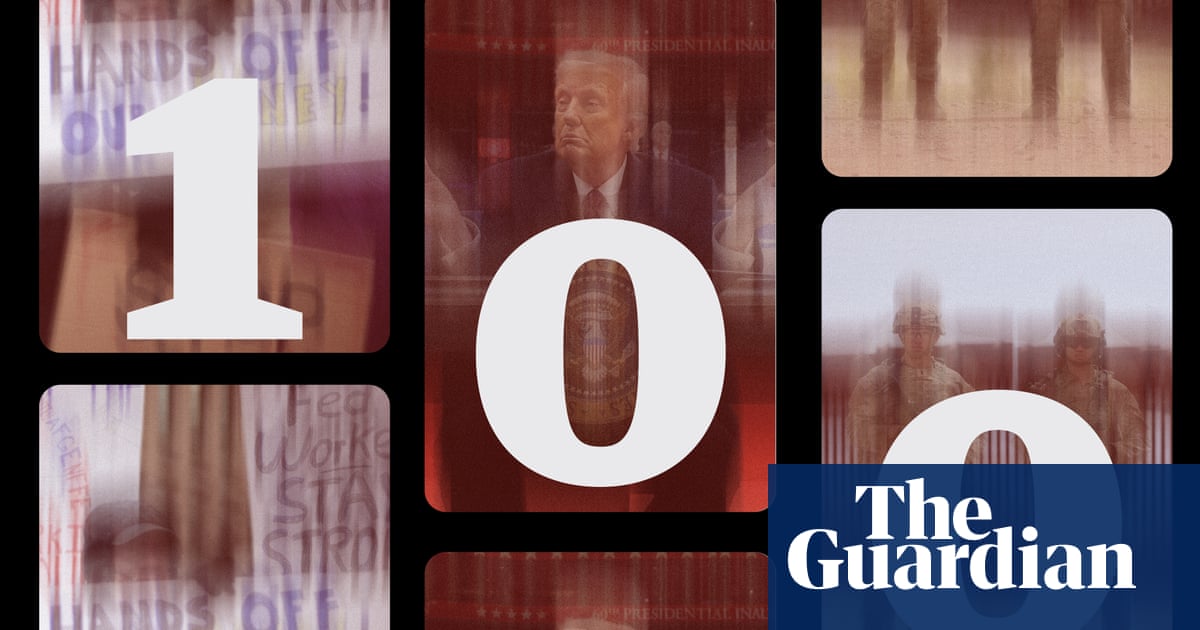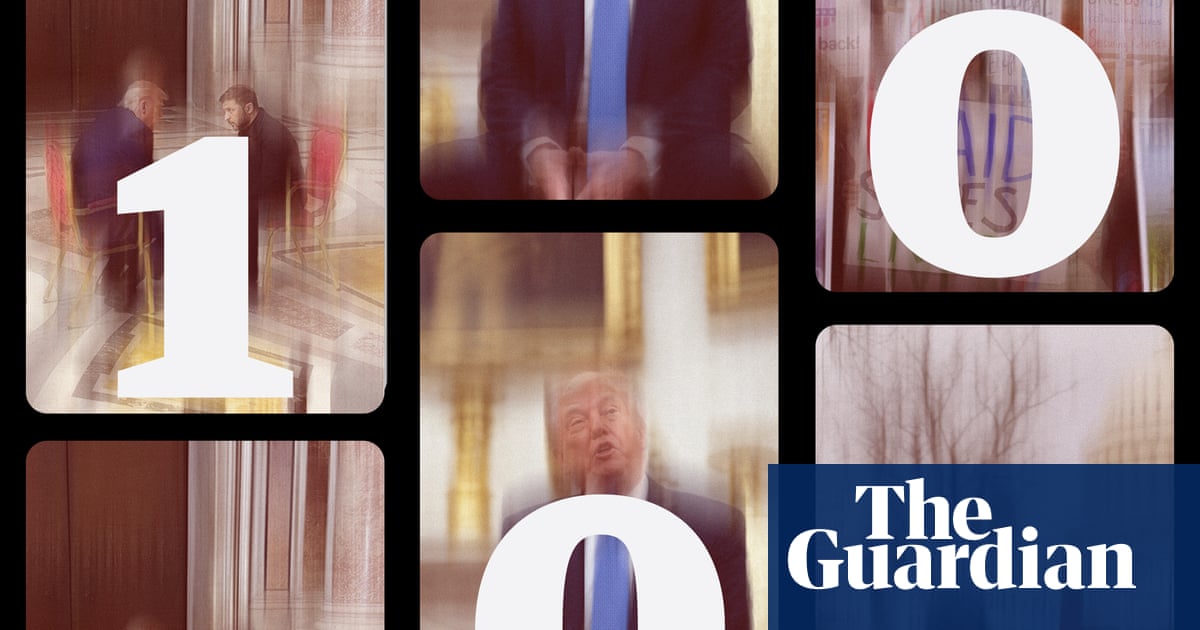Trump signs three new executive orders
The president signed orders ramping up the administration’s crackdown on immigration:
-
“Protecting American communities from criminal aliens”, which targets sanctuary cities that the administration believes aren’t cooperating enough with immigration crackdowns.
-
“Strengthening and unleashing America’s law enforcement to pursue criminals and protect innocent citizens”, which provides legal defense for police accused of misconduct.
-
“Enforcing commonsense rules of the road for America’s truck drivers”, which requires professional truck drivers to speak English.
Key events Show key events only Please turn on JavaScript to use this feature
Today’s recap
Nearly 100 days in office and Donald Trump continued to steadily address his campaign promises to crack down on immigration and focus on law and order. The president issued three new executive orders on Monday, which included taking aims at so-called “sanctuary cities” and shoring up legal protections for police accused of misconduct.
The orders come as the so-called “department of government efficiency” continued to pursue federal job cuts at the Department of Defense and, for the first time, the Peace Corps.
Here’s what else happened today:
-
Prosecutors filed charges against Mario Bustamante Leiva for allegedly stealing Homeland security secretary Kristi Noem’s purse.
-
Trump creates a “Fema review council” to “fix a terribly broken system” of delivering aid to Americans struck by disasters, naming defense secretary Pete Hegseth and Noem to the council.
-
House Republicans proposed paying tens of billions of dollars for Trump’s border wall construction.
-
Trump threatened to veto the bipartisan Senate resolution focused on “liberation day” tariffs.
-
Immigration and Customs Enforcement officials are seeking unaccompanied immigrant children, sparking fears of a “backdoor family separation”.
-
As Canadians headed to the polls, Trump issued a statement threatening Canada’s independent sovereignty, describing the border between the two nations as an “artificially drawn line from many years ago”.
-
Treasury secretary Scott Bessent and top GOP negotiators are due to meet Monday evening to likely discuss next steps for the GOP’s party-line budget megabill.
-
Congressman Gerry Connolly, the top Democrat on the oversight committee, announced he will not run for re-election after being diagnosed with a recurrence of cancer.
-
China insisted that “no phone call” took place recently between President Xi Jinping and Trump. This comes after Trump said he had spoken with the Chinese leader.
-
More than 300 law enforcement officers from at least 10 federal agencies raided a nightclub in Colorado Springs, arresting more than 100 people.
The third executive order Donald Trump signed on Monday seeks to require all professional truck drivers to be proficient in English. If the driver cannot speak and read English, the order says, the Department of Transportation has the authority to place them “out-of-service”.
“Proficiency in English … should be a non-negotiable safety requirement for professional drivers,” reads the order. Trumps says his the order is to support truckers and make the roads safer.
The transportation secretary, Sean Duffy, released a statement on Monday saying his agency would be taking action on the executive order. “This commonsense standard should have never been abandoned,” Duffy said.
It’s unclear how many truck drivers don’t speak English and what sort of impact that has on roadways. The executive order comes the same day as Trump announced he was ramping up his immigration crackdown.
Donald Trump signed an executive order on Monday aimed at boosting legal protections for police. The order says it will create best practices to “unleash high-impact local police forces” and protect and defend officers who’ve been “wrongly accused”.
“The result will be a law-abiding society,” the order says.
Under the order, the US attorney general will provide legal resources to police, increase officer pay and seek higher sentences for crimes against law enforcement. Additionally, the secretary of defense will see how the military and other national security personnel can help in preventing crime.
If state and local jurisdictions don’t follow along, the attorney general will be able to pursue “all necessary legal remedies”.
Donald Trump made good on his promise to target sanctuary cities that he says aren’t going along with his administration’s immigration crackdown.
The president signed an executive order on Monday titled Protecting American communities from criminal aliens, in which he claims some state and local officials “use their authority to violate, obstruct, and defy the enforcement of Federal immigration laws”. The executive order says this amounts to a “lawless insurrection against the supremacy of Federal law”.
Trump reiterates many of his talking points around immigration in the order, saying there’s an “invasion at the southern border” and the federal government must take measure to protect national security.
To carry out his plans, Trump says he will create a list of states and local jurisdictions that “obstruct the enforcement of federal immigration laws” and terminate or suspend their federal funding. Additionally, the US attorney general and secretary of homeland security will be given authorization to pursue “all necessary legal remedies and enforcement measures to end these violations”.
Trump signs three new executive orders
The president signed orders ramping up the administration’s crackdown on immigration:
-
“Protecting American communities from criminal aliens”, which targets sanctuary cities that the administration believes aren’t cooperating enough with immigration crackdowns.
-
“Strengthening and unleashing America’s law enforcement to pursue criminals and protect innocent citizens”, which provides legal defense for police accused of misconduct.
-
“Enforcing commonsense rules of the road for America’s truck drivers”, which requires professional truck drivers to speak English.
Nick Robins-Early
Elon Musk’s Doge conflicts of interest worth $2.37bn, says a Senate report.
Elon Musk and his companies face at least $2.37bn in legal exposure from federal investigations, litigation and regulatory oversight, according to a new report from Senate Democrats. The report attempts to put a number to Musk’s many conflicts of interest through his work with his so-called “department of government efficiency” (Doge), warning that he may seek to use his influence to avoid legal liability.
The report, which was published on Monday by Democratic members of the Senate homeland security committee’s permanent subcommittee on investigations, looked at 65 actual or potential actions against Musk across 11 separate agencies. Investigators calculated the financial liabilities Musk and his companies, such as Tesla, SpaceX and Neuralink, may face in 45 of those actions.
Since Donald Trump won re-election last year and Musk took on the role of de facto head of Doge in January, ethics watchdogs and Democratic officials have warned that the Tesla CEO could use his power to oust regulators and quash investigations into his companies. In the role, Musk, the richest man in the world, holds sway over agencies that regulate or contract with his companies. The subcommittee report outlines the extent of Musk’s liabilities, which include potentially facing $1.19bn in fines to Tesla alone over allegations it made false or misleading statements about its autopilot and self-driving features.
Read more here:
Suspect named in Noem purse stealing incident
Prosecutors filed charges against Mario Bustamante Leiva on Monday. He was charged with federal robbery and wire fraud for stealing US homeland security secretary Kristi Noem’s purse while she was dining at a restaurant on Easter Sunday, according to the 34-page charging document.
Bustamante Leiva, a 49-year-old Chilean national, was arrested and taken into custody in Washington DC on Saturday after an investigation by the US Secret Service and the Metropolitan police department.
The charging documents say that cameras recorded Bustamante Leiva sitting at a table near Noem (Noem is not directly named, she’s identified as “Victim-3”). He then allegedly edged his chair back toward her and discreetly nabbed her purse, which was by her feet.
Noem’s purse reportedly had $3,000 in cash and her keys, driver’s license, passport and homeland security badge. Noem posted on Twitter/X yesterday that a suspect had been arrested and he “is a career criminal who has been in our country illegally for years”. Bustamante Leiva’s immigration status is unclear.
Trump creates a 'Fema review council'
Donald Trump is putting together a council to review the Federal Emergency Management Agency (Fema). In a Truth Social post, the president said that this council will “work hard to fix a terribly broken System”. Fema’s mission is to help Americans struck by disasters, such as floods, hurricanes and fires.
Trump said the council will be made up of “Top Experts in their fields” and who are “Highly Respected by their peers”. The people he’s appointed include secretary of defense Pete Hegseth, secretary of homeland security Kristi Noem, Texas governor Greg Abbott and Virginia governor Glenn Youngkin. He said they will “return power to State Emergency Managers” and “MAKE AMERICA SAFE AGAIN”.
Trump denied federal aid to Arkansas after the state was ravaged by tornadoes in March. The storms killed more than 40 people. Governor Sarah Huckabee, a Republican, and other Arkansas lawmakers have since publicly asked Trump to reconsider his decision and Huckabee sent an appeal of the decision on 18 April.
Doge cuts at Peace Corps begin
The Peace Corps is offering various staff a second “fork in the road” buyout, according to a source familiar with the matter. Allison Greene, the CEO of Peace Corps, sent an email to staff on Monday with an update about the Department of Government Efficiency’s (Doge) assessment of the agency.
Greene said to expect “significant restructuring efforts” at Peace Corps headquarters, according to the email seen by the Guardian. Starting on April 28 and going through May 6, direct hire and expert staff are being offered a second Deferred Resignation Program, what Doge has referred to as a “fork in the road” buyout. Those staff will receive an email from the Chief Human Capital Officer and “are strongly encouraged to consider this option”. Some “mission-critical” positions may not be eligible for the Deferred Resignation Program.
A Peace Corps spokesperson confirmed on Monday that Doge began an assessment of the agency’s operations earlier this month and the new Deferred Resignation buyout has begun.
Doge started its work at Peace Corps headquarters at the beginning of April. Bridget Youngs, a Doge representative, requested access to the agency’s financial records and Doge has continued work at the agency throughout the month.
Greene wrote in her email to staff that the Peace Corps will “continue to recruit, place, and train Volunteers”. The Peace Corps has had more than 240,000 volunteers since its inception in 1961, when it was created by John F Kennedy. The agency’s mandate has been to send volunteers to other countries to work on public health, economic development and education projects.
House Republicans propose allocating tens of billions of dollars to pay for Trump's border wall construction

Chris Stein
House Republicans have proposed allocating tens of billions of dollars to pay for border wall construction, in an effort to make good on a contentious campaign promise that dates back to Donald Trump’s first term in office.
The moves come as Republicans set to work this week on writing a massive bill expected to pay for many of the president’s priorities, including mass deportations of undocumented immigrants, extending tax cuts enacted during his first term, and potentially ending the taxation of tips, overtime and Social Security payments. To pay for it, the GOP is mulling major cuts to federal safety net programs including Medicaid and the food assistance program known as SNAP.
House committees are now beginning to write sections of the bill that deal with programs under their jurisdictions, and the homeland security committee has proposed allocating $46.5bn to border wall construction, including more than 700 miles of new wall, 900 miles of river barriers, and the replacement of 141 miles of vehicle and pedestrian barriers. While it did not say where the barriers would be built, most would likely go to the southern border with Mexico, which Trump has long wanted to seal with a full-length wall. Many Democrats oppose the barrier as ineffective and draconian, and a previous standoff over funding for the wall in late 2018 led to the longest government shutdown in US history.
In addition, the homeland security committee will propose billions more in spending to increase surveillance and inspections at US borders, and to hire 3,000 more Border Patrol officers and 5,000 customs officers.
The bill faces what is expected to be a long road to enactment, with some Republicans uneasy over cutting safety net programs or tax credits first implemented under Joe Biden.
The day so far
-
Donald Trump is expected to sign two new executive orders this afternoon related to immigration, according to the White House, including one targeting so-called “sanctuary cities” and another the administration says will strengthen law enforcement. Speaking to reporters on Monday morning, White House press secretary Karoline Leavitt said that one of the orders will aim to “strengthen and unleash America’s law enforcement to pursue criminals and protect innocent citizens”. The second order will target so-called “sanctuary cities”, she said, and will direct the attorney general and secretary of homeland security to publish a list of state and local jurisdictions that Leavitt said “obstruct the enforcement of federal immigration laws”. Story here.
-
Trump this morning threatened a veto of the bipartisan Senate resolution intended to cancel out the emergency powers underpinning his sweeping global “Liberation Day” tariffs. The OMB sent a statement of administration policy to congressional offices this morning, vowing a veto and saying the resolution “would undermine the administration’s efforts to address the unusual and extraordinary threats to national security and economic stability, posed by the conditions reflected in the large and persistent annual US goods trade deficit”. The Senate is set to vote on the measure this week, led by Democratic senator Ron Wyden and Republican Rand Paul.
-
Immigration and Customs Enforcement (Ice) officials are seeking out unaccompanied immigrant children in operations nationwide with a view to deporting them or pursuing criminal cases against them or adult sponsors sheltering them legally in the US, according to sources and an Ice document. The moves are sparking fears of a crackdown on such children and prompting alarm about what one critic called “backdoor family separation”. Story here.
-
Trump issued a statement overnight on the eve of Canada’s election, again threatening the country’s independent sovereignty, and describing the border between the two nations as an “artificially drawn line from many years ago”. In a post on his Truth Social platform, Trump said “Good luck to the great people of Canada” on the eve of the election, and then urged them to become the 51st state of the US, claiming it would bring tax cuts, and increased military power. You can follow all our coverage of Canada’s election day here.
-
Treasury secretary Scott Bessent and top GOP negotiators, including House speaker Mike Johnson and Senate majority leader John Thune, are due to meet at 4pm ET today at the Capitol, likely to discuss the next steps for the GOP’s party-line budget megabill to kickstart Trump’s domestic agenda. Now that Congress has returned, just how riven the party is over spending will become clear in the weeks to come, my colleague Chris Stein reports.
-
Gerry Connolly, the top Democrat on the House of Representatives’ key oversight committee, announced he will not run for re-election and resign his committee post, citing a return of the cancer for which he previously been successfully treated. His retirement from the top leadership position paves the way for generational change on the influential panel, after he beat Alexandria Ocasio-Cortez for the seat last autumn. Story here.
White House says Trump would veto Senate effort to eliminate ‘Liberation Day’ tariffs
Trump this morning threatened a veto of the bipartisan Senate resolution intended to cancel out the emergency powers underpinning his sweeping global “Liberation Day” tariffs, the Daily Caller reports.
The Office of Management and Budget sent a statement of administration policy to congressional offices this morning, vowing a veto and saying the resolution “would undermine the administration’s efforts to address the unusual and extraordinary threats to national security and economic stability, posed by the conditions reflected in the large and persistent annual US goods trade deficit”.
Trump declared a national emergency on 2 April in order to impose tariffs in response to various trade practices including “the large and persistent annual US goods trade deficit”. Congress has the power to force a vote on terminating these emergency powers, subject to a simple majority vote in both chambers.
The Senate is set to vote on the measure as early as this week, led by Democratic senator Ron Wyden and Republican Rand Paul.
Trump urges Canadians to make their country the 51st state of the US in election intervention
Donald Trump issued a statement overnight on the eve of Canada’s election, again threatening the country’s independent sovereignty, and describing the border between the two nations as an “artificially drawn line from many years ago”.
In a post on his Truth Social platform, Trump started by wishing “Good luck to the great people of Canada,” on the eve of the election, and then urged them to become the 51st state of the US, claiming it would bring tax cuts, and increased military power.
He wrote:
Good luck to the great people of Canada. Elect the man who has the strength and wisdom to cut your taxes in half, increase your military power, for free, to the highest level in the world, have your car, steel, aluminum, lumber, energy, and all other businesses, quadruple in size, with zero tariffs or taxes, if Canada becomes the cherished 51st state of the US. No more artificially drawn line from many years ago. Look how beautiful this land mass would be. Free access with no border. All positives with no negatives. It was meant to be! America can no longer subsidize Canada with the hundreds of billions of dollars a year that we have been spending in the past. It makes no sense unless Canada is a state!
Ice seeking out unaccompanied immigrant children to deport or prosecute them
Joseph Gedeon
Immigration and Customs Enforcement (Ice) officials are seeking out unaccompanied immigrant children in operations nationwide with a view to deporting them or pursuing criminal cases against them or adult sponsors sheltering them legally in the US, according to sources and an Ice document.
The moves are sparking fears of a crackdown on such children and prompting alarm about what one critic called “backdoor family separation”.
In recent months, the Department of Homeland Security (DHS) and Ice have begun engaging in “welfare checks” on children who arrived in the US alone, usually via the US-Mexico border, to “ensure that they are safe and not being exploited”, according to a DHS spokesperson.
Although DHS is characterizing the welfare visits as benevolent, an internal Ice document accessed by the National Immigration Project advocacy group and then shared shows Ice is also seeking out children who came into the US alone as immigrants – and their US-based sponsors – for immigration enforcement purposes and/or to pursue criminal prosecutions. The recent operations and document confirm a February report from Reuters, that the Trump administration has directed Ice to track down and deport this group.
GOP budget negotiators to meet today to hash out next steps as Republican unity faces major tests on megabill
Treasury secretary Scott Bessent and top GOP negotiators, including House speaker Mike Johnson and Senate majority leader John Thune, are due to meet at 4pm ET today at the Capitol, likely to discuss the next steps for the GOP’s party-line budget megabill to kickstart Trump’s domestic agenda, Politico reports.
Now that Congress has returned, just how riven the party is over spending will become clear in the weeks to come, my colleague Chris Stein reports. In particular, he highlights, Republicans must set to work crafting the bill amid an economy made newly precarious by Trump’s on-again, off-again approach to tariff policy.
The “big, beautiful bill” envisioned by Trump will extend tax cuts enacted during his first term, fund more border defenses and mass deportations of undocumented immigrants and potentially include his vow to end the taxation of tips, overtime and social security payments. To pay for it, the GOP is eyeing dramatic reductions in government spending, and has targeted social safety net programs relied on by tens of millions of Americans.
But even with the cuts, experts say this could be one of the steepest increases to the federal deficit in recent US history – a prospect which has tested the resolve the Republican party’s relatively small congressional majorities. While many lawmakers insist that government spending must be reined in to manage the country’s budget deficit at a time of high borrowing costs, small groups of lawmakers have already registered their opposition to dismantling programs they say help their constituents.
Bill Hoagland, a former top budget adviser to Republican senators who is now a senior vice-president at the Bipartisan Policy Center thinktank, told Chris:
The budget resolution that they adopted is unique, I would say, somewhat unprecedented. What they’ve done here is keep the ball moving by kicking the can further down the road and leaving unsettled a number of differences, particularly on the spending side.
President Donald Trump’s approval rating among Hispanic voters has dipped to 34%, according to a Reuters/Ipsos poll.
Since the president took office, his approval rating among Latinos has fallen 3% in the midst of ongoing concerns surrounding the economy, as well as the administration’s unyielding approach to immigration and ceaseless deportations.
Trump’s disapproval ratings among Hispanic voters reached 61%, up 7 percentage points, compared with a 5% increase among Americans overall, reaching 53%. Trump had won 46% of the Hispanic vote in November’s election, 14 points higher than in 2020.
Allison D. Burroughs, the federal judge overseeing Harvard’s lawsuit accusing the Trump administration of government intrusion into its operations, has set a hearing date for July 21st.
The Trump administration froze $2.2bn in federal funding to Harvard this month after it refused a list of demands that included ending diversity programs and halting the admission of international students deemed “hostile to American values.” Harvard is looking to stop the funding freeze and has filed a lawsuit against the administration, alleging that it is trying to “gain control of academic decision-making at Harvard”.

In a continuation of ongoing federal job cuts, officials say personnel cuts across the Defense Department will delay plans to hire at least 1,000 more civilians, per the Associated Press. These new hires would be intended to help prevent sexual assault, suicides and behavior problems within the US military.
Officials say plans to have about 2,500 personnel in place by fiscal year 2028 have been slowed due to the hiring freeze and cuts.

 2 days ago
2 days ago
 (200 x 200 px).png)








 English (US) ·
English (US) ·